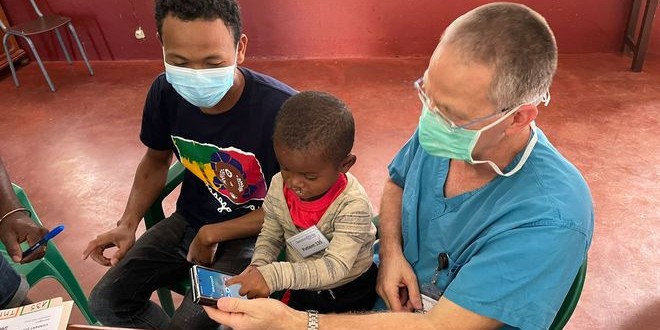A team of surgeons from Rambam Medical Center in Haifa recently returned from the island of Madagascar in the Indian Ocean off the coast of East Africa to perform dozens of operations to repair cleft-palates and tongues in children.
The local hospitals of the second-largest country in the world that consists of islands, which has a population of 30 million, employ only five surgeons able to perform such surgery.
For the 10th time, Dr. Omri Emodi – deputy director of the department of oral and maxillofacial surgery at Rambam where he focuses on all aspects of treatment for patients with craniofacial deformities – has been leading teams to Third World countries to treat cleft palates and tongues that cause severe deformities and complications in children.
Dr. Emodi received his degree in dental medicine at Amsterdam University in 1998 and joined the department of maxillofacial surgery at Rambam in 2002. He was board certified in oral and maxillofacial surgery in 2008. During a fellowship at the University Hospitals of North Carolina, he acquired clinical experience in treating children with craniofacial deformities including cleft lip and cleft palate. In 2020, he received an MD degree from the Technion-Israel Institute of Technology’s Rappaport Faculty of Medicine.
He performs his surgical marathons around the world as a member of Operation Smile medical corps. He went to Madagascar with Dr. Zach Sharoni, a senior physician in Rambam’s plastic surgery department. They joined dozens of medical professionals from different countries who are part of Operation Smile. They recently returned from another mission, this time in the Madagascar’s northern port city of Toamasina, where they worked for 10 days.
Cleft palate repair closes the opening in the palate to restore the structure and function of the palate; it is a common birth defect, and major surgery that can pose serious risks and potential complications if not done properly. There are also environmental influences, including alcohol abuse or suffering from diabetes by their mothers. Most babies with cleft palate undergo the surgery between nine and 12 months of age. The clefts are repaired in part to facilitate feeding, but most importantly to support normal speech.
Many children in Third World countries do not have the luxury of undergoing surgery, and they will grow up with unrepaired clefts, leading to social isolation, speech problems and feeding problems.
Surgery involves moving tissue from the edges of the cleft into the cleft area. Clefts affect the soft palate, which is the posterior part of the roof of the mouth. If you move your tongue along the roof of your mouth from front to back, you will notice the roof of your mouth becomes soft as you move your tongue towards the back. The soft palate moves when we speak, to prevent air from escaping into your nose and causing a hypernasal quality. When that happens, it becomes difficult for the child to produce many speech sounds and have abnormal speech.
Some of the parents who brought their children to the volunteer team made their way for many weeks from various places throughout Madagascar, all to receive medical treatment that could change their lives from end to end: The arrival dates of the delegations are usually announced six months in advance and people come from all over the country. We dedicate the first few days to sorting the cases and making decisions regarding the prioritization of the cases for analysis. Those who are not taken care of this time, will be invited to the next time.”
With the completion of the examination of the cases, dozens of members of the delegation, who came this time from 31 countries from all over the world, organized to perform surgeries. In five operating rooms set up for the benefit of the project, for more than 12 consecutive operating hours each day, the patients were operated on by the multidisciplinary team that includes surgeons, anesthesiologists, pediatricians, dentists, nurses, technicians, imaging personnel and many more who volunteered their time and skills.
“We found ourselves operating together with colleagues from the US, Sweden, England and even neighboring Egypt,” recalled Emodi. Ethiopia, Vietnam, Ghana and India are just a small list of the places where the two Haifa doctors have been in the previous humanitarian missions. Operation Smile, based in the US, has performed in 40 Third World countries for more than 40 years and has performed over 200,000 surgeries.
“It is difficult to describe in words the feelings of a long and meaningful encounter with a population who live in conditions of severe poverty, without electricity or running water and without access to basic conditions such as medical services,” the Israeli surgeons said, “just as it is difficult to describe the satisfaction from the result of surgery that takes about an hour and a half but completely changes the life of the child and his family. In Madagascar alone, there are still over 2,000 children waiting for cleft lip surgery, so there is still a lot of work ahead of us.”
The shortcode is missing a valid Donation Form ID attribute.



